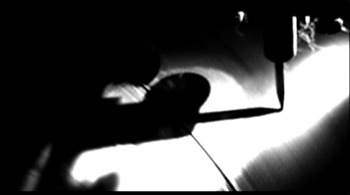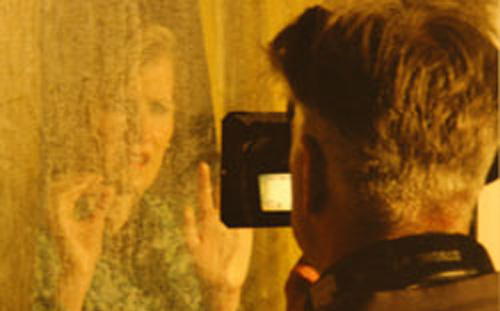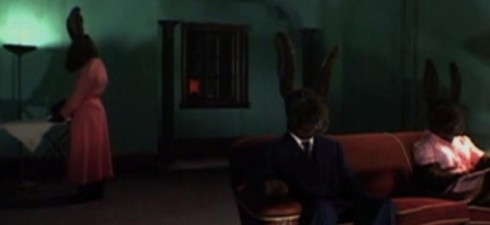 ‘What time is it?’
‘What time is it?’
‘It’s after midnight.’
In one of the key, echoed scenes of Inland Empire (2006), Laura Dern’s character ascends a dark staircase to a strange office, where a man with glasses listens to her tell her story: of a dark time recalled from her past. She says that she can’t tell what came before, and what came after. The narrative line of her memories escapes her, and has left her confused. Like Mulholland Drive and Lost Highway, Inland Empire explores the doiubling of the protagonist’s identity: but more in this film than the others, Laura Dern’s characters struggle under the connections between these identities. One of the first images in the film is the turntable, and this stands as a fitting representation of the narrative line: rotating, bringing scenes back into proximity, and occasionally ‘jumping’ between unexpected points of contact.
Recently I’ve rediscovered my old journal books. I wrote every day between 1994 and 2005, and these years mark some huge steps in the development of my personality. Reading back, I’ve been struck by a paradox that reminded me of the emotional dynamics of Inland Empire: that I feel both alienated from, and hugely sympathetic to these former versions of myself. In some ways, they sound just like me: yet, in a practical sense, they may as well be other people. My only accessible and comprehensible ‘reality’ is who I am right now, and although I (in some important senses) descend from those former psychologies, I can no more objectively access those people than I can access future versions of myself. Yet I feel their presence, pushing upon this moment.
As Lynch’s film progresses, it moves towards a kind of epiphany, where ‘women in trouble’ find moments of resolution and peace. It has been suggested that the final scenes try to express something of Lynch’s belief in the power of Transcendental Meditation. Indeed, transcendence seems to be the only way to escape the dark and collapsing worlds of the film: spiralling down towards death. The need for an ‘escape hatch’ also fits well within my received worldview. Yet, the theology that emerged from Joseph Smith, Jr., to my mind, is strongly immanent: that is to say, it tries to situate the sacred experience on earth, and in the body. The Book of Mormon predicts a personal moment of reckoning where, in some altered relationship to time and the body, human beings will have ‘a bright recollection of all our guilt’ (Alma 11:43). This may be read as a straightforward attempt to scare (who would want to remember ‘guilt’?), but it could be understood differently, when we view ourselves in less punitive ways. When I read through my old journals, I don’t feel guilty: but sympathetic, and somehow, redeemed. It’s difficult to say why I feel this way, but it’s been the case time and again as I’ve read. I feel that if I, somehow, got all my memory back one day, I’d feel a proportional increase in love and understanding for the totality of my life’s memories and efforts. It wouldn’t matter how many of those memories documented ‘good’ or ‘bad’ choices: they reflect my evolving desires and understanding of the world. The record of my memories reflect my humanity: and wherever I find humanity, I feel connection, and love.
 For now, however, we see ‘through a glass, darkly’, and Inland Empire generates dramatic tension through the strength of these disconnects. In the uncanny, strange moments of contact between worlds, characters and situations, partial recognition highlights the persistent problem of our sense of self. One of the strong themes in the film is the psychological ubiquity of representation. In the most emotionally charged moments, we are (or become) aware that what we are seeing is a cinematic image: orchestrated and recorded by professional storytellers. We always experience a mediated version of the world.
For now, however, we see ‘through a glass, darkly’, and Inland Empire generates dramatic tension through the strength of these disconnects. In the uncanny, strange moments of contact between worlds, characters and situations, partial recognition highlights the persistent problem of our sense of self. One of the strong themes in the film is the psychological ubiquity of representation. In the most emotionally charged moments, we are (or become) aware that what we are seeing is a cinematic image: orchestrated and recorded by professional storytellers. We always experience a mediated version of the world.
So, at the conclusion of this three-part journey, we find ourselves not at the end of a highway: but at a point of simultaneous departure and arrival. Lynch’s films form a satisfyingly coherent body of work that challenges us through startlingly direct assaults on the dark places of our unconscious minds. We have much to gain by being brave: by being willing to experience these cinematic texts, and uncover the elements within us that respond to them, in such powerful ways. I extend that challenge to you! Please share your adventures with us, here.
NEXT WEEK: A guest post from ‘White Cygnet’ explores her impressions of Aronofsky’s new film, ‘Black Swan’ (2010). For our schedule, check in here.
